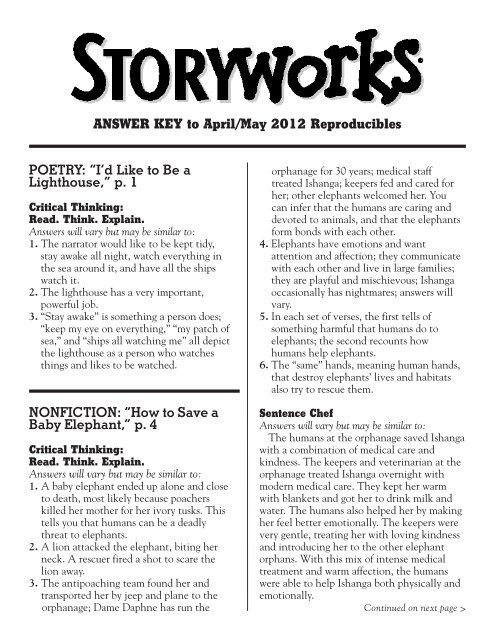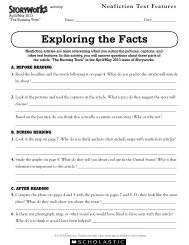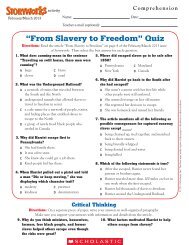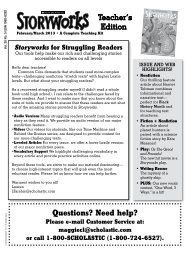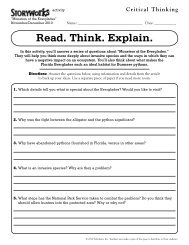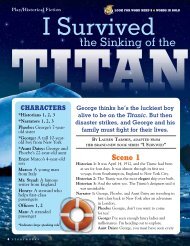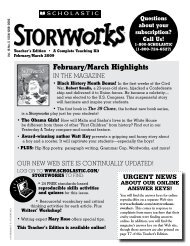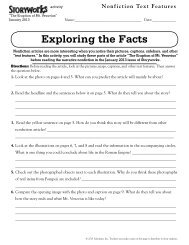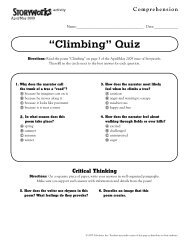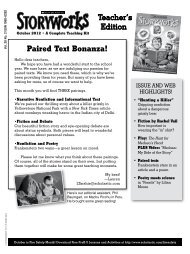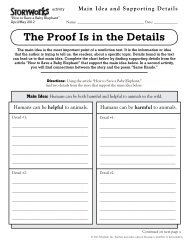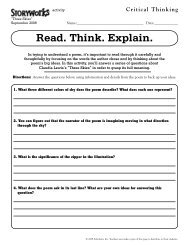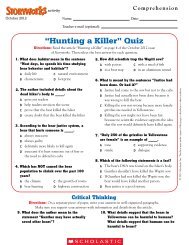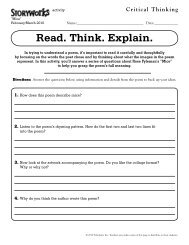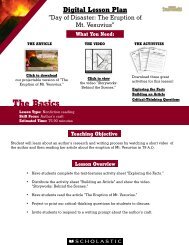ANSWER KEY to April/May 2012 Reproducibles POETRY: ?I'd Like ...
ANSWER KEY to April/May 2012 Reproducibles POETRY: ?I'd Like ...
ANSWER KEY to April/May 2012 Reproducibles POETRY: ?I'd Like ...
You also want an ePaper? Increase the reach of your titles
YUMPU automatically turns print PDFs into web optimized ePapers that Google loves.
<strong>ANSWER</strong> <strong>KEY</strong> <strong>to</strong> <strong>April</strong>/<strong>May</strong> <strong>2012</strong> <strong>Reproducibles</strong><br />
<strong>POETRY</strong>: “I’d <strong>Like</strong> <strong>to</strong> Be a<br />
Lighthouse,” p. 1<br />
Critical Thinking:<br />
Read. Think. Explain.<br />
Answers will vary but may be similar <strong>to</strong>:<br />
1. The narra<strong>to</strong>r would like <strong>to</strong> be kept tidy,<br />
stay awake all night, watch everything in<br />
the sea around it, and have all the ships<br />
watch it.<br />
2. The lighthouse has a very important,<br />
powerful job.<br />
3. “Stay awake” is something a person does;<br />
“keep my eye on everything,” “my patch of<br />
sea,” and “ships all watching me” all depict<br />
the lighthouse as a person who watches<br />
things and likes <strong>to</strong> be watched.<br />
NONFICTION: “How <strong>to</strong> Save a<br />
Baby Elephant,” p. 4<br />
Critical Thinking:<br />
Read. Think. Explain.<br />
Answers will vary but may be similar <strong>to</strong>:<br />
1. A baby elephant ended up alone and close<br />
<strong>to</strong> death, most likely because poachers<br />
killed her mother for her ivory tusks. This<br />
tells you that humans can be a deadly<br />
threat <strong>to</strong> elephants.<br />
2. A lion attacked the elephant, biting her<br />
neck. A rescuer fired a shot <strong>to</strong> scare the<br />
lion away.<br />
3. The antipoaching team found her and<br />
transported her by jeep and plane <strong>to</strong> the<br />
orphanage; Dame Daphne has run the<br />
orphanage for 30 years; medical staff<br />
treated Ishanga; keepers fed and cared for<br />
her; other elephants welcomed her. You<br />
can infer that the humans are caring and<br />
devoted <strong>to</strong> animals, and that the elephants<br />
form bonds with each other.<br />
4. Elephants have emotions and want<br />
attention and affection; they communicate<br />
with each other and live in large families;<br />
they are playful and mischievous; Ishanga<br />
occasionally has nightmares; answers will<br />
vary.<br />
5. In each set of verses, the first tells of<br />
something harmful that humans do <strong>to</strong><br />
elephants; the second recounts how<br />
humans help elephants.<br />
6. The “same” hands, meaning human hands,<br />
that destroy elephants’ lives and habitats<br />
also try <strong>to</strong> rescue them.<br />
Sentence Chef<br />
Answers will vary but may be similar <strong>to</strong>:<br />
The humans at the orphanage saved Ishanga<br />
with a combination of medical care and<br />
kindness. The keepers and veterinarian at the<br />
orphanage treated Ishanga overnight with<br />
modern medical care. They kept her warm<br />
with blankets and got her <strong>to</strong> drink milk and<br />
water. The humans also helped her by making<br />
her feel better emotionally. The keepers were<br />
very gentle, treating her with loving kindness<br />
and introducing her <strong>to</strong> the other elephant<br />
orphans. With this mix of intense medical<br />
treatment and warm affection, the humans<br />
were able <strong>to</strong> help Ishanga both physically and<br />
emotionally.<br />
Continued on next page >
<strong>ANSWER</strong> <strong>KEY</strong> <strong>to</strong> <strong>April</strong>/<strong>May</strong> <strong>2012</strong> <strong>Reproducibles</strong>, p. 2<br />
NONFICTION (cont’d): “How <strong>to</strong><br />
Save a Baby Elephant,” p. 4<br />
Main Idea and Supporting Details:<br />
The Proof Is in the Details<br />
Answers will vary but may be similar <strong>to</strong>:<br />
• Humans can be helpful <strong>to</strong> animals.<br />
Detail #1: The rescuers who found Ishanga<br />
saved her from a lion attack and rushed her <strong>to</strong><br />
the David Sheldrick Wildlife Trust.<br />
Detail #2: Dame Daphne Sheldrick created<br />
an elephant orphanage that has raised and<br />
released 130 elephants in<strong>to</strong> the wild.<br />
• Humans can be harmful <strong>to</strong> animals.<br />
Detail #1: Ishanga’s mother was killed, most<br />
likely by poachers who wanted her ivory tusks.<br />
Detail #2: When poachers kill a mother<br />
elephant, its baby usually dies <strong>to</strong>o because<br />
baby elephants can’t survive on their own.<br />
ARTICLE DETAILS<br />
Poem Verse 1: Tsavo National Park in Kenya<br />
is a 7,850-square-mile reserve where more<br />
than 10,000 elephants live.<br />
Poem Verse 2: Poachers kill elephants and<br />
chop off their tusks <strong>to</strong> sell for thousands of<br />
dollars, even though most countries have laws<br />
against selling ivory.<br />
Poem Verse 3: Poachers set wire traps<br />
throughout the park; keepers and<br />
veterinarians worked intensively <strong>to</strong> save<br />
Ishanga.<br />
Poem Verse 4: Poachers cut off elephants’<br />
tusks; Ishanga has found a new life at the<br />
orphanage, and she will eventually return <strong>to</strong><br />
the wild.<br />
Vocabulary:<br />
Elephant Words<br />
1. G<br />
2. F<br />
3. I<br />
4. B<br />
5. E<br />
6. A<br />
7. C<br />
8. D<br />
9. H<br />
10. pounce on it<br />
11. significant
<strong>ANSWER</strong> <strong>KEY</strong> <strong>to</strong> <strong>April</strong>/<strong>May</strong> <strong>2012</strong> <strong>Reproducibles</strong>, p. 3<br />
FICTION: “Roy’s Secret,” p. 10<br />
Critical Thinking:<br />
Read. Think. Explain.<br />
Answers will vary but may be similar <strong>to</strong>:<br />
1. Roy is anxious; he has a s<strong>to</strong>machache from<br />
thinking about his secret and is worried<br />
about being late. He is also responsible. He<br />
does his chores and hurries <strong>to</strong> his job; he<br />
doesn’t have time for games.<br />
2. His secret is that he keeps the fairy-tale<br />
book hidden and reads it when Mr. Banner<br />
falls asleep. He keeps it a secret because he<br />
doesn’t want anyone <strong>to</strong> buy the book and<br />
because the book offers him a private world.<br />
3. It tells you that Roy is a dreamer. He likes<br />
escaping <strong>to</strong> another world that is very<br />
different fom his life. He is also caring; he<br />
brings the s<strong>to</strong>ries home <strong>to</strong> share with the<br />
foster kids.<br />
4. He likes the fantastic characters, like giants<br />
and elves; he likes the magical events<br />
that take place;he likes the old-fashioned<br />
language that people use.<br />
5. Answers may include that books give you<br />
the power <strong>to</strong> escape <strong>to</strong> another world;<br />
books can make you happy and excited;<br />
books provide you with s<strong>to</strong>ries <strong>to</strong> share with<br />
others.<br />
Character:<br />
Who Is This Boy Roy?<br />
Answers will vary but may be similar <strong>to</strong>:<br />
Description: Roy has tangled brown hair<br />
and wears simple long-sleeve T-shirts. He<br />
has a s<strong>to</strong>machache at the beginning of the<br />
s<strong>to</strong>ry because he’s thinking about his secret.<br />
He is nervous about finishing his chores and<br />
getting <strong>to</strong> the bookshop on time. He loves the<br />
bookshop, especially the smell and the peace<br />
and quiet of it. He likes the look and the feel<br />
of the cover of The Little Book of Fairy Tales,<br />
and he likes the magical s<strong>to</strong>ries inside it. He<br />
also likes sharing the s<strong>to</strong>ries with the foster<br />
kids. Roy likes his dog, Rex, and even though<br />
Mr. Banner is sometimes grumpy, Roy is fond<br />
of him.<br />
Actions: Roy does his chores before going <strong>to</strong><br />
the bookshop. On his way there, he greets his<br />
neighbors but hurries along so he won’t be<br />
late. At the bookshop, he sweeps and hauls<br />
out the trash, and when Mr. Banner falls<br />
asleep, he looks at The Little Book of Fairy<br />
Tales. At home, he tells the foster children<br />
s<strong>to</strong>ries every night.<br />
Dialogue: Roy’s few lines include, “Hurry,”<br />
“Sorry,” and Thank you.” This tells us that he<br />
is quiet and polite.<br />
Conclusion: Students may conclude that Roy<br />
is responsible, caring, nervous, friendly, polite,<br />
and a boy who likes <strong>to</strong> dream.<br />
Setting:<br />
Roy’s Worlds<br />
Answers will vary but may be similar <strong>to</strong>:<br />
Characters Roy encounters<br />
• Real World: Roy sees his neighbors, Mr.<br />
Banner, his mom, and the foster children.<br />
• Fairy-Tale World: Roy encounters<br />
giants, elves, greedy queens, talking wolves,<br />
enchanted princes turned in<strong>to</strong> frogs, dogs,<br />
girls, hunters, and doves.<br />
Details describing the surroundings<br />
• Real World: In Roy’s neighborhood, people<br />
tend tiny gardens in front of their apartment<br />
buildings, boys play basketball, mothers<br />
push strollers, and all sorts of people fill the<br />
sidewalks. The bookshop is quiet and stacked<br />
with books everywhere. His home is crowded<br />
with foster children and their clothes, <strong>to</strong>ys,<br />
cots, and shoes.<br />
• Fairy-Tale World: Mountains are made of<br />
glass; there are castles and a house made of<br />
bread and cake.<br />
What Roy likes about this world<br />
• Real World: Roy loves his job in the quiet<br />
bookshop; he likes Mr. Banner; he likes<br />
entertaining the foster kids with s<strong>to</strong>ries.<br />
• Fairy-Tale World: Roy likes faraway places,<br />
enchanted creatures, and characters who do
<strong>ANSWER</strong> <strong>KEY</strong> <strong>to</strong> <strong>April</strong>/<strong>May</strong> <strong>2012</strong> <strong>Reproducibles</strong>, p. 4<br />
PLAY: Hugo, p. 16 Georges<br />
Critical Thinking:<br />
Read. Think. Explain.<br />
1. Hugo’s father dies; his uncle makes him quit<br />
school; his uncle disappears, leaving Hugo<br />
alone; and Hugo must avoid being sent <strong>to</strong><br />
an orphanage. You can conclude that his life<br />
is sad and lonely.<br />
2. It is a link between him and his father, and<br />
working on it is the only thing that makes<br />
him happy. Hugo believes that if he can fix<br />
it, it will write a message from his father.<br />
3. Georges is broken like the au<strong>to</strong>ma<strong>to</strong>n;<br />
neither can do what they were meant <strong>to</strong><br />
do. Hugo’s and Isabelle’s lines at the end of<br />
Scene 5 show this.<br />
4. The au<strong>to</strong>ma<strong>to</strong>n has been fixed because<br />
Isabelle has its key; Hugo has a family;<br />
Georges rediscovers the magic of the films he<br />
made and loves.<br />
5. Georges’s purpose was <strong>to</strong> create magic<br />
through the movies. When the war (World<br />
War I) started, no one had time for movies<br />
and he had <strong>to</strong> sell his studio and films. He<br />
regained his purpose because Hugo and<br />
Isabelle discovered that one of his films still<br />
existed and introduced him <strong>to</strong> Tabard, who<br />
allowed him <strong>to</strong> pursue his love of film again.<br />
Theme:<br />
A Big Idea<br />
Answers will vary but may be similar <strong>to</strong>:<br />
Hugo<br />
1. He is broken because he misses his father and<br />
spends his days alone, secretly maintaining the<br />
clocks in the train station.<br />
2. He discovers that Georges made the first<br />
movie his father ever saw. The au<strong>to</strong>ma<strong>to</strong>n<br />
draws a picture from the movie.<br />
3. By the end of the play he is fixed because he<br />
has become part of a family with Georges,<br />
Isabelle, and Jeanne.<br />
1. He is broken because the world lost interest<br />
in his films, and he had <strong>to</strong> get rid of his film<br />
studio.<br />
2. He discovers that his film A Trip <strong>to</strong> the Moon<br />
still exists. Hugo and Isabelle were doing<br />
research at the Film Academy Library when a<br />
film professor revealed it <strong>to</strong> them.<br />
3. By the end of the play he is fixed because<br />
people once again appreciate his work, and he<br />
teaches at the Film Academy.<br />
Plot: “It’s <strong>Like</strong> a Puzzle . . .”<br />
Answers will vary but may be similar <strong>to</strong>:<br />
1. Hugo and his father work on the au<strong>to</strong>ma<strong>to</strong>n<br />
<strong>to</strong>gether, but then his father dies.<br />
2. Hugo lives alone in the train station,<br />
maintaining the clocks.<br />
3. Hugo sneaks in<strong>to</strong> Georges’s <strong>to</strong>y shop, and<br />
Georges takes Hugo’s notebook.<br />
4. Hugo talks <strong>to</strong> Isabelle about getting his<br />
notebook back.<br />
5. Hugo discovers that Isabelle has the key <strong>to</strong><br />
make the au<strong>to</strong>ma<strong>to</strong>n work.<br />
6. The au<strong>to</strong>ma<strong>to</strong>n draws a picture that prompts<br />
Hugo and Isabelle <strong>to</strong> do research about<br />
Georges at the Film Academy Library.<br />
7. Rene Tabard reveals <strong>to</strong> Hugo and Isabelle—<br />
and Georges—that he still has one of<br />
Georges’s films.<br />
8. Georges tells his s<strong>to</strong>ry, ending with the loss<br />
of his au<strong>to</strong>ma<strong>to</strong>n. As Hugo retrieves the lost<br />
au<strong>to</strong>ma<strong>to</strong>n, Georges rescues Hugo from the<br />
Station Inspec<strong>to</strong>r.<br />
9. Hugo has a home and family again, and<br />
Georges returns <strong>to</strong> work in film.<br />
Vocabulary:<br />
Hugo Scavenger Hunt<br />
Answers will vary but may be similar <strong>to</strong>:<br />
1. Synonym: android; An<strong>to</strong>nym: human<br />
2. A diamond gleams.<br />
Continued on next page >
<strong>ANSWER</strong> <strong>KEY</strong> <strong>to</strong> <strong>April</strong>/<strong>May</strong> <strong>2012</strong> <strong>Reproducibles</strong>, p. 5<br />
PLAY: Hugo, p. 16 (cont.)<br />
3. Annie was devastated when her best friend<br />
moved away.<br />
4. a compass or a GPS device<br />
5. An<strong>to</strong>nym: cheerful<br />
6. The notebook connects Hugo <strong>to</strong> his<br />
father, and it has his father’s designs for the<br />
au<strong>to</strong>ma<strong>to</strong>n in it.<br />
7. The Wright Brothers were among the<br />
original pioneers of flight.<br />
8. An<strong>to</strong>nym: realistic<br />
How did the person become<br />
deaf?<br />
How did he or she<br />
communicate in early<br />
childhood?<br />
What role did the person’s<br />
family play?<br />
What school options are/were<br />
available for deaf children?<br />
How did he or she learn<br />
American Sign Language?<br />
What helps/helped the person<br />
communicate, aside from<br />
American Sign Language?<br />
What are/were the person’s<br />
attitudes about American Sign<br />
Language?<br />
has been deaf since birth<br />
COMPARE AND CONTRAST:<br />
“Say Hello <strong>to</strong> Julio,” p. 21<br />
Critical Thinking:<br />
Read. Think. Explain.<br />
Answers will vary but may be similar <strong>to</strong>:<br />
1. It allows him <strong>to</strong> learn in school, talk <strong>to</strong> his<br />
friends, and express himself.<br />
2. A new school and a new language became<br />
accessible <strong>to</strong> her; she could communicate with<br />
others.<br />
3. Answers may include that she would be proud<br />
that she helped found ASL and deaf education;<br />
she would feel at home with people who speak<br />
her language; she would be surprised <strong>to</strong> see<br />
hearing aids and speech methods; etc.<br />
Compare & Contrast:<br />
Julio and Alice<br />
Answers will vary but may be similar <strong>to</strong>:<br />
Julio Alice Similar Different<br />
started learning ASL at school<br />
at age 3, along with his mom<br />
His mom was supportive and<br />
learned ASL along with him.<br />
Some students attend schools<br />
for the deaf, and some are in<br />
classes with hearing students.<br />
Methods include sign language<br />
and speech.<br />
at school<br />
a hearing aid and speech<br />
classes<br />
ASL is his favorite way <strong>to</strong> communicate.<br />
It is not hard for him<br />
at all.<br />
became deaf at age 2 from a serious<br />
illness<br />
had no language x<br />
Her dad was supportive and sent<br />
Gallaudet <strong>to</strong> Europe <strong>to</strong> learn how <strong>to</strong><br />
teach Alice.<br />
No options were available. x<br />
helped created it along with Gallaudet,<br />
Clerc, and other students<br />
not mentioned in article x<br />
When she learned ASL, she felt like<br />
she had been “freed from a silent<br />
<strong>to</strong>mb.”<br />
x<br />
x<br />
x<br />
x
<strong>ANSWER</strong> <strong>KEY</strong> <strong>to</strong> <strong>April</strong>/<strong>May</strong> <strong>2012</strong> <strong>Reproducibles</strong>, p. 6<br />
GRAMMAR COP:<br />
“The Green Thumbs,” p. 25<br />
Punctuation:<br />
Punctuation Perfection<br />
Guess Who’s Coming <strong>to</strong> Dinner?<br />
By the time I spy the horrible insect, I<br />
know it might be <strong>to</strong>o late. The enormous<br />
bug, with its spiky legs, hairy face, long<br />
antennae, and red eyes, has already spotted<br />
my plate of spaghetti and is crawling its way<br />
across the table. I’m in a panic. “Oh, no!<br />
What is that thing? What should I do?”<br />
I ask my friends.<br />
“How should I know?” asks my friend Bill,<br />
who’s sitting next <strong>to</strong> me. He doesn’t seem<br />
bothered.<br />
Thankfully, my friend Gina is something<br />
of an expert on insects. “I’ll take care of<br />
this!” she declares. She stands and begins<br />
searching the kitchen for the proper <strong>to</strong>ol.<br />
I wish she would hurry.<br />
She considers a pair of scissors, a<br />
newspaper, a box of frozen pizza, and a<br />
salt shaker.<br />
“Hurry, Gina, there’s not much time!”<br />
I shout, getting nervous. Should I make<br />
a run for it?<br />
“This should do it!” she says triumphantly.<br />
She stands on a chair, grips a large mixing<br />
bowl, and swiftly lowers it a<strong>to</strong>p the beast.<br />
Before I know it, she has flipped over the<br />
bowl and covered the opening with a frying<br />
pan, trapping the creepy-crawly inside. She<br />
rushes <strong>to</strong> the window, yanks it open, and<br />
flings the creature out. It flies a mile away, at<br />
least.<br />
“Phew, that was close,” she says with a<br />
smile. As we sit down and I get back <strong>to</strong><br />
my pasta, I feel lucky <strong>to</strong> have such a brave<br />
friend. I can only hope that the monster<br />
doesn’t have any friends around . . .<br />
DEBATE:<br />
“Standing Up <strong>to</strong> a Bully” p. 28<br />
Persuasive Writing:<br />
Write an Essay<br />
Answers will vary.<br />
VOCAB LAB, p. 30<br />
Vocabulary: Puzzle It Out<br />
Across<br />
4. reluctantly<br />
6. crave<br />
8. intertwine<br />
Down<br />
1. chaos<br />
2. solemn<br />
3. gleam<br />
4. revive<br />
5. bucked<br />
7. awe
<strong>ANSWER</strong> <strong>KEY</strong> <strong>to</strong> <strong>April</strong>/<strong>May</strong> <strong>2012</strong> <strong>Reproducibles</strong>, p. 7<br />
<strong>POETRY</strong>:<br />
“Three Little Puffins,” p. 32<br />
Critical Thinking:<br />
Read. Think. Explain.<br />
Answers will vary but may be similar <strong>to</strong>:<br />
1. Three puffins eat so many muffins they<br />
become puffy. It is nonsense because the<br />
puffins behave like silly humans.<br />
2. They make it more fun <strong>to</strong> read.<br />
3. The poet made up nuffin and chuffin’.<br />
Pantin’/puffin’ and chewin’/chuffin’ show<br />
alliteration. The words add <strong>to</strong> the playful<br />
sound of the poem.<br />
Poetry Writing:<br />
Write Your Own Nonsense Poem<br />
“Three Little Puffins”<br />
1. Three puffins eat so many muffins that they<br />
become puffy.<br />
2. puffins/muffins/nuffin/puffin’/chuffin’/<br />
stuffin’; be/tea/me<br />
3. AAB<br />
4. lively, quick, upbeat, continuous<br />
“My Nonsense Poem”<br />
Answers will vary.


